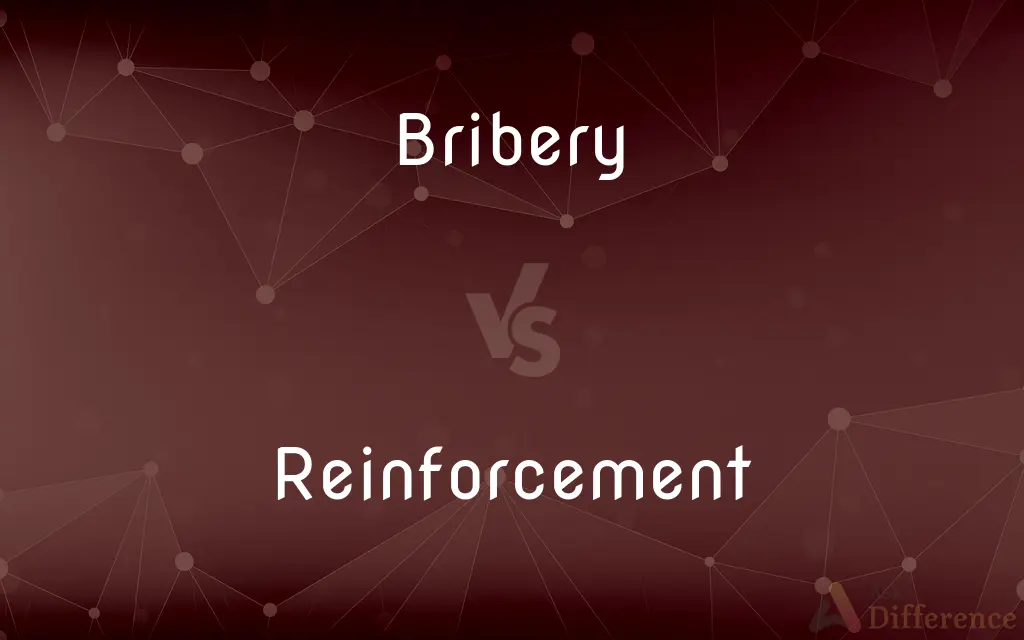Bribery vs. Reinforcement — What's the Difference?
By Tayyaba Rehman & Fiza Rafique — Published on February 29, 2024
Bribery involves offering something to influence behavior unethically, while reinforcement uses rewards or consequences to shape behavior positively or negatively.

Difference Between Bribery and Reinforcement
Table of Contents
ADVERTISEMENT
Key Differences
Bribery is an unethical practice where something of value is offered to persuade or influence someone's actions or decisions. It often involves corruption and is considered illegal in many contexts. Reinforcement, on the other hand, is a psychological principle used in behavior modification. It involves providing rewards (positive reinforcement) or removing negative stimuli (negative reinforcement) to increase the likelihood of a desired behavior.
Bribery aims to alter behavior for personal or organizational gain through unethical means, while reinforcement seeks to encourage or discourage certain behaviors within an ethical framework, such as in education or therapy. The intent behind bribery is usually self-serving, exploiting the recipient's position or authority for personal advantage. In contrast, reinforcement is often used with a developmental or corrective intention, focusing on long-term behavior change.
The outcomes of bribery and reinforcement also differ significantly. Bribery can lead to legal consequences, loss of reputation, and a breakdown in organizational or societal trust. Reinforcement, when applied correctly, leads to learning, personal growth, and the development of positive habits or behaviors.
The application contexts of these two concepts are also different. Bribery is common in business, politics, and any situation where undue influence is sought over decision-making processes. Reinforcement is widely used in educational settings, parenting, therapy, and behavior modification programs.
In terms of ethical considerations, bribery is almost universally condemned for undermining fairness, integrity, and trust. Reinforcement is generally viewed as a positive and ethical approach to encouraging desirable behaviors, as long as it is applied fairly and appropriately.
ADVERTISEMENT
Comparison Chart
Definition
Offering something valuable to influence behavior unethically.
Using rewards or consequences to shape behavior.
Intent
To gain undue advantage or influence.
To encourage or discourage certain behaviors.
Ethical Implications
Generally unethical and often illegal.
Ethical if used appropriately.
Outcomes
Can lead to legal issues and loss of trust.
Aims for positive behavior change or learning.
Application Context
Common in business and politics.
Used in education, therapy, and behavior management.
Compare with Definitions
Bribery
Providing favors to gain advantage.
Bribery in the form of job promises was used to obtain confidential information.
Reinforcement
Rewarding to encourage behavior.
Positive reinforcement, like praise, was used to promote teamwork.
Bribery
Offering money for a favorable decision.
The contractor was accused of bribery for trying to influence the city official.
Reinforcement
Applying consequences to shape actions.
Negative reinforcement involved removing chores as a reward for good grades.
Bribery
Giving gifts to sway judgment.
He resorted to bribery, providing luxury trips to secure contracts.
Reinforcement
Behavior modification technique.
Consistent reinforcement helped in overcoming bad habits.
Bribery
Unethical inducement for action.
Bribery undermines the fairness of competitive processes.
Reinforcement
Strengthening desired responses.
Reinforcement in the classroom boosted student participation.
Bribery
Illegal persuasion method.
The company faced charges for its involvement in international bribery.
Reinforcement
Using incentives for motivation.
The training program included reinforcement to ensure skill acquisition.
Bribery
The act or practice of giving or taking bribes; the act of influencing the official or political action of another by corrupt inducements.
Reinforcement
The process whereby a behavior with desirable consequences comes to be repeated.
Bribery
The act or practice of offering, giving, or taking a bribe.
Reinforcement
The act or process of reinforcing or the state of being reinforced.
Bribery
Robbery; extortion.
Common Curiosities
Can reinforcement be considered a form of bribery?
No, reinforcement is an ethical practice used in learning and behavior modification, unlike bribery, which is unethical and often illegal.
What is reinforcement?
Reinforcement is a strategy in behavior management that uses rewards or consequences to encourage or discourage certain behaviors.
What is bribery?
Bribery involves offering something valuable to improperly influence someone's behavior or decisions.
What are the outcomes of bribery?
Bribery can lead to legal consequences, loss of reputation, and erosion of trust.
What makes bribery unethical?
Bribery is unethical because it undermines fairness, integrity, and trust in relationships and institutions.
How do bribery and reinforcement differ in intent?
Bribery aims for personal or organizational gain through unethical means, while reinforcement aims to shape behavior positively within an ethical framework.
Can reinforcement be negative?
Yes, negative reinforcement involves removing an unpleasant stimulus to encourage a behavior.
How is reinforcement used in education?
In education, reinforcement is used to encourage participation, improve behavior, and enhance learning through rewards or positive feedback.
What are examples of positive reinforcement?
Examples include praise, rewards, or privileges given to reinforce desirable behaviors.
Can bribery ever be justified?
Ethically, bribery is difficult to justify as it compromises integrity and fairness, though some cultural contexts may have different perspectives on minor forms of bribery.
What are the outcomes of reinforcement?
Properly applied reinforcement leads to positive behavior change, learning, and development.
Is bribery always illegal?
While bribery is often illegal, especially in business and politics, the legality can vary depending on jurisdiction and context.
What are common forms of bribery?
Common forms include offering money, gifts, or favors to influence decisions or actions.
Is reinforcement effective in all situations?
Reinforcement can be very effective but must be tailored to the individual and context for optimal results.
How does negative reinforcement differ from punishment?
Negative reinforcement encourages a behavior by removing negative stimuli, while punishment discourages a behavior by applying negative consequences.
Share Your Discovery

Previous Comparison
Pitbulls vs. American Staffordshire Terriers
Next Comparison
Red Tiger Balm vs. White Tiger BalmAuthor Spotlight
Written by
Tayyaba RehmanTayyaba Rehman is a distinguished writer, currently serving as a primary contributor to askdifference.com. As a researcher in semantics and etymology, Tayyaba's passion for the complexity of languages and their distinctions has found a perfect home on the platform. Tayyaba delves into the intricacies of language, distinguishing between commonly confused words and phrases, thereby providing clarity for readers worldwide.
Co-written by
Fiza RafiqueFiza Rafique is a skilled content writer at AskDifference.com, where she meticulously refines and enhances written pieces. Drawing from her vast editorial expertise, Fiza ensures clarity, accuracy, and precision in every article. Passionate about language, she continually seeks to elevate the quality of content for readers worldwide.
















































